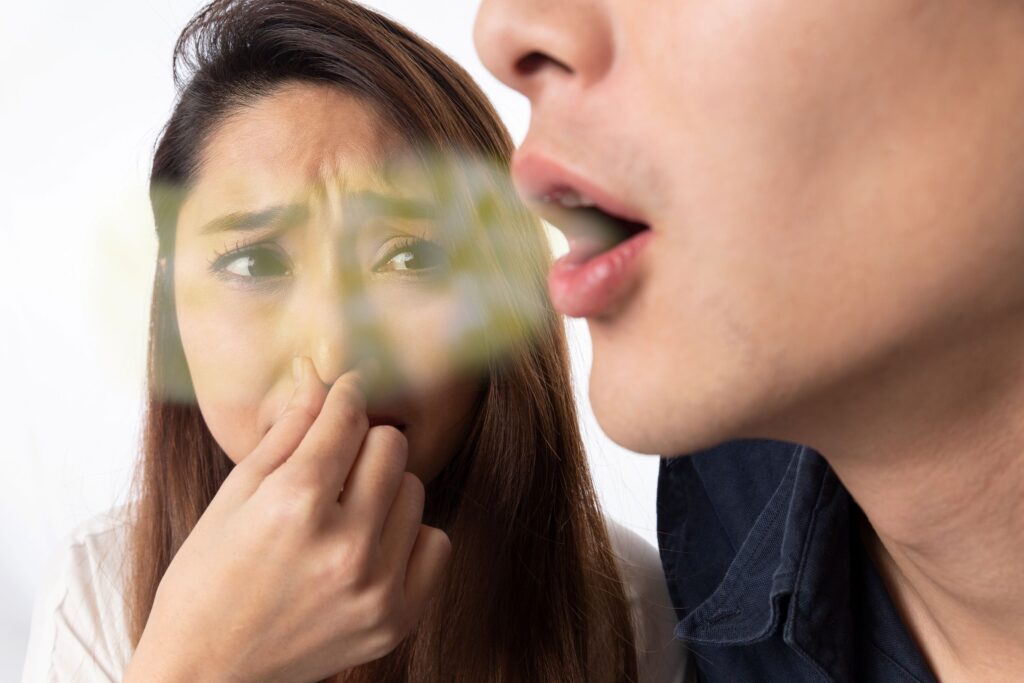
Most people don’t worry much about their dental condition unless they’re having an immediate issue, like cavities, gum disease, or even chronic bad breath (halitosis). If you’ve noticed an unsavory taste in your mouth lately, it’s only natural to wonder what might be causing it and how urgently it should be addressed.
There are several potential reasons you might have developed a nasty flavor on your tongue. Continue reading to learn about 3 of them!
Cause #1: Poor Dental Hygiene
Your mouth is full of bacteria that contribute to dental concerns like tooth decay or periodontal problems. Although a consistent at-home dental hygiene routine of brushing and flossing twice daily helps prevent such dilemmas, there’s no guarantee that you won’t develop them at some point.
Unfortunately, if germs in your mouth are allowed to thrive, they can erode your enamel and infect your connective tissues. Then, as they interact with proteins in your mouth, they produce smelly gases known as volatile sulfur compounds (VSCs) that can also create an unpleasant taste. You may need to contact your provider to schedule a routine checkup and cleaning to address it.
Cause #2: Dry Mouth
The bacteria in your mouth flourish in dry conditions, and if your mouth doesn’t produce enough saliva, you’re more likely to notice a foul flavor or bad breath. There are many reasons people develop dry mouth, including (but not limited to):
- Certain prescription medications like antidepressants or diuretics.
- Pre-existing medical conditions like diabetes, lupus, or thyroid disease.
- Nerve damage.
- Chemotherapy.
- Sleep apnea.
- Mouth breathing.
Thankfully, you can prevent this from occurring by drinking more water to keep your mouth hydrated and clean. Additionally, you may want to discuss alternative medications with your doctor if you suspect that it might be the underlying cause. Some prescription drugs have substitutes that can preserve your overall well-being without harming your dental health.
Cause #3: Hormonal Changes
Women who are pregnant or menopausal may be more likely to experience a bitter taste in their mouths due to changes in hormonal balances. If your body is transitioning through one of these phases, it might explain the changes you’ve noticed.
For example, during gestation, fluctuations in estrogen levels can alter your sense of taste, often resulting in a metallic or sour flavor in your mouth in a condition known as dysgeusia. Then, during menopause, estrogen levels drop, which can lead to a condition called burning mouth syndrome. This causes a rancid taste or searing sensation that can make it difficult to eat or drink until it’s addressed.
Your dentist is happy to help identify the cause of the bad flavor in your mouth and can refer you to an appropriate physician if the underlying issue is not related to your teeth.
Meet the Author
Dr. Sean Bannan understands the connection between your dental and general health and strives to improve your well-being by enhancing your oral condition. He earned his Doctor of Dental Surgery from the University of Michigan School of Dentistry and stays current with the latest developments in technology and techniques through active participation in professional organizations, like the American Dental Association. He offers a comprehensive menu of services to meet the unique needs of patients of all ages, and utilizes state-of-the-art equipment to boost comfort while delivering accurate results. You can request an appointment on the website or by calling (386) 516-4351.
